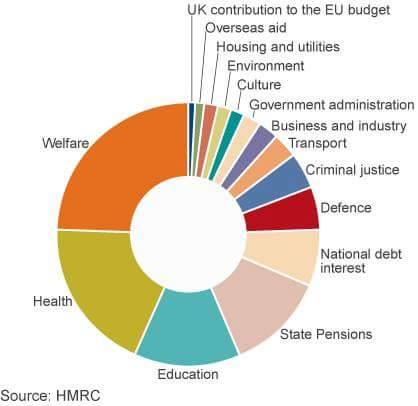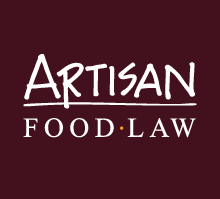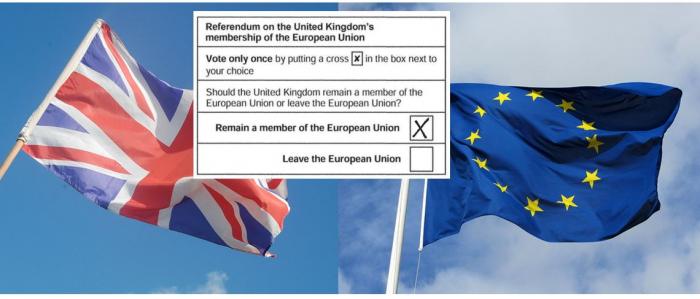The EU is the better choice for artisan and small scale food producers
It may come as a surprise to those who have read all the criticism of EU regulations to be found elsewhere on this blog, but remaining a part of the EU is by far the better choice for small scale food producers. The UK must remain an integral and key player in the future of Europe following the vote this Thursday.
The debate around what the UK contributes to the EU is well-rehearsed, suffice to say here that it amounts to just 11.8p a day to the average taxpayer or 0.37% of GDP in 2015 – the thinnest of slices at 12 o’clock in the chart below. Contrast this with all the benefits derived from membership and it soon starts to look good value for money.

The so-called ‘democratic deficit’ expressed in the mantra ‘take back control’ conveniently neglects the fact that decisions in the EU are taken by elected ministers in the EU Council and directly elected members of theEuropean Parliament which share the final say on all EU laws. The Commission may propose draft laws but in doing so it fulfils a similar role to that of our own Civil Service. Contrary to what the supporters of Brexit would have you believe, the UK has been outvoted on the EU Council on 57 occasions out of a total of 2,544 over the last 16 years. The UK has supported almost 98% of decisions taken and has been rarely overruled.
The CAP accounts for 40% of the EU budget and up to £3 billion a year is paid to farmers in the UK. It is pure wishful thinking to believe this funding would continue in full over even the short term. In order to secure access to the single market the UK would have to make a payment into the EU budget roughly equivalent to that presently paid – with no say in how it is spent and with none of it coming back to the UK. The average farm receives between €17,000 and €36,000 a year in direct subsidy, the collapse of farming in the UK would only be a matter of time.
Presently, 73% of UK food exports go to the EU. Outside the single market comes the prospect of import tariffs, the loss of available migrant workers, which comprise 65% of the agricultural workforce not including seasonal workers, and the UK would still have to comply with EU standards and regulations. It is perhaps no surprise that some 60% of food businesses fear a vote to leave will be bad for business.
There is no question that, following the introduction of general food Regulation (EC) 178/2002, the EU has driven up food standards in a generally positive way taking a ‘from farm to fork’ approach. Consumers are now also, for the most part, accurately and fairly informed about food purchases and the rules apply fairly to all producers.
There is an extensive body of EU directives and regulations covering animal health, veterinary medicines, feeding stuffs, animal welfare, food and feed safety and hygiene, food labelling and compositional standards. In some areas, animal welfare for example, the UK voluntarily maintains higher standards and there is no reason to suppose these would not continue. The adoption of the same rules throughout the whole of Europe clearly makes life so much simpler, and greatly increases the diversity of food products available to all.
A significant proportion of regulatory requirements are based on international standards, particularly those concerning food, so there would be little change in them if the UK left the EU.
The law is given effect through a regime of inspections and official controls supported to some extent by staff based in Brussels and elsewhere in Europe. There would be an additional administrative cost in replicating these necessary services.
Studies undertaken by the Organisation for Economic Cooperation and Development (OECD) show that the UK already has the second least regulated product markets among industrial countries and the least regulated labour market in the EU. On the other hand, regulation also has benefits and those regulations most loudly complained about are invariably domestic in origin and could be dropped tomorrow.
The EU protected food names scheme has attracted much attention in recent weeks. There would be some continuing protection if the UK left the EU since the scheme allows non-EU countries to seek protected names for their national products in appropriate cases. In the event of the UK leaving the EU protected food names would, somewhat ironically, enjoy protection within the EU but not in the UK. The Cornish Pasty Association is clear that it supports remaining in the EU.
The hope that regulation and red tape will be swept away is superficially attractive, but it is no more than a faint hope and will not come to fruition. It is notable that much food and consumer regulation introduced in the EU is based on what was in place in the UK in the first place, the EU in significant respects has simply amended and adopted aspects of UK law. In short, nothing would change in these areas following a vote to leave.
Compliance with EU regulations will, as earlier noted, continue for any producer wishing to export to the EU, as in the cases of both Norway and Switzerland. A former Norwegian foreign minister explained Norway loyally abides by Brussels’ decisions, has incorporated about 75% of all EU legislative acts into Norwegian legislation, grants the free movement of people, goods, services and capital, and pays a contribution to the EU’s budget, but has no say in any of these matters.
The most confident prediction that can be made is that a vote to leave the EU would be followed by an extended period of chaos and confusion while armies of lawyers work out what is and is not actually enforceable and what new legislation may be required, many years down the track there will likely be ever more bureaucracy and complexity, albeit of a different order. The concern must be that the agenda would be set by a dumbing down of standards that would come from the pressure to trade with the United States. It is worth remembering that the supporters of Brexit are just that and their promises are hollow, they would require a new government elected in 2020 with a democratic mandate for them to be implemented.
Yes, there are changes and improvements which could be made to food legislation, not everything works well, especially for artisan and small scale food producers. It cannot be right that regulations designed for industrial scale production in large factories are fit for purpose when it comes to applying them to, for example, a small artisan cheesemaker. The way to effect change, however, is from within.
A vote to leave would be hugely damaging to many small scale food producers, many may never recover, the burgeoning independent food scene in the UK would be dealt a serious blow. Much better to work on what we have than throw it all away.
Photo credits: flickr.com and flickr.com





